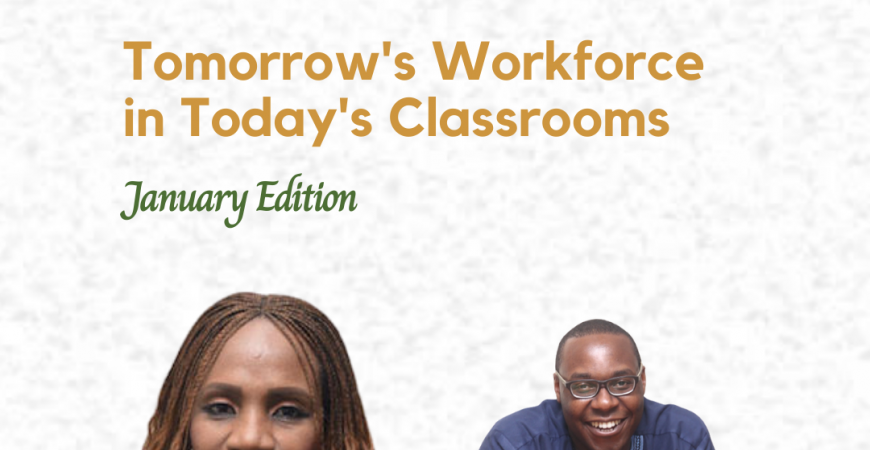Date: 1st February 2022
Title: Tomorrow’s Workforce in Today’s Classrooms
Speakers: Mrs. Bolanle Adewole (Executive Director, The Learning Place) and Mr. Chizaram Ucheaga (Co-Founder, Mavis Computel Limited)
Key questions asked:
- What skills deficit exist amongst the African youth population?
- What are factors that have limited the development of skills in young people?
- How do we close the gap and create a balance between the classroom and industry?
- What is the role of innovation in pedagogy in closing these gaps?
- With an understanding of global market relevance, what quality skills will significantly reduce youth unemployment in Africa?
Summary of points made
Chizaram Ucheaga
- His understanding of the topic “Tomorrow’s Workforce in Today’s Classrooms” is preparing children for the future they are about to face.
- Money (finance skills), technology skills and people skills are important skills young people need to learn or gain knowledge in.
- Our current curriculum in Nigeria limits the development of the young people. Our curriculum is outdated and as such it is not fit for now or the near future.
- We need to use technology to shorten the learning gap in our education system.
- The curriculum needs to be tailored to fit the purpose of the industry. Examples of institutions that currently do this are Nexford University, Huawei, Zte.
- There needs to be a shift towards learner-centered models in schools and the classroom. This will prepare the children for the future of work.
- Money skills, technology skills and people skills are skills that will significantly reduce youth unemployment in Africa.
- We need to be more data driven in our decisions.
Bolanle Adewole
- Her understanding of the topic “Tomorrow’s Workforce in Today’s Classrooms” is preparing tomorrow’s employees and being deliberate about what you invest in them. Developing the right skills that will be necessary for them to get into the workplace. It’s never too early to start to prepare children to have the necessary tools for the work environment.
- After preparing them, placing them where they can exhibit what they have learnt is very essential.
- Children with special needs can be functional and beneficial to the society.
- The skills young people should have are:
i) emotional intelligence: the ability to understand that everybody exists in their own space and to step into that space.
ii) problem solving skills: critical reasoning and analytical thinking should be infused into the curriculum from a young age.
iii) self-management and self-control: knowing that there is a level of constraint I need to have in certain environments.
iv) infrastructure: having the right environment and tools to thrive.
v) practical experience: it is in the doing that knowledge is assimilated.
- It is important to first identify the skills needed before identifying factors that can limit the development of those skills.
- Factors that have limited the development of the skills in people are:
i) Government regulations and backing from government to guide and help or promote innovation. There is the need for the right environment for innovation to thrive.
ii) Funding. People have the ideas but not enough funding to make the dreams a reality.
- To close the gap and create a balance between the classroom and the industry, the classroom needs to know what the industry needs. There has to be a relationship that is constant and fluid between the classroom and the industry e.g. internships
- The schools need to have a partnership with the industry to know what is needed there.
- It is important to identify the uniqueness of every child or learner. Everyone has an innate ability that needs to be taped.
- Technology, education, and sales (the ability to market and sell yourself); emotional intelligence, empathy and being reliable are quality skills that will significantly reduce youth unemployment in Africa.
- If our style of teaching is modified, we will move further in life. We need the understand the uniqueness of each child.
- Thinking out of the box is not enough. You need to create your own box.
- We have to be deliberate about the skill set we want teachers to have…teacher training is very important.
You can watch a recording of January’s edition of the NICE Innovation Series HERE

